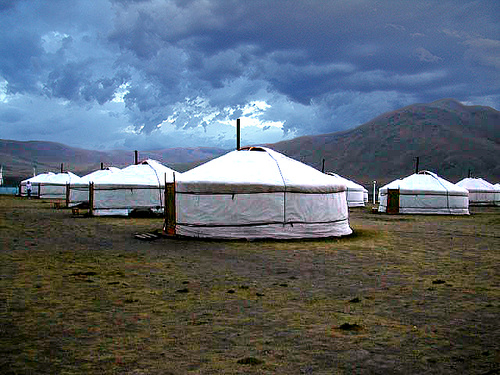When I embarked on my own personal journey to become a Professional Hobo and travel the world, one of my mandates was to volunteer for worthy causes wherever I went. Being a Rotarian (where the motto of every member is to provide community “service above self”), it only seemed natural that I should apply my altruistic values wherever they are needed and wanted.
Vagabondish is reader-supported. When you buy through links on our site, we may earn a small affiliate commission. Read our disclosure.
But the more I researched volunteer service organizations and tour companies, the more I found myself sliding down the rabbit hole of a newly coined form of tourism in and of itself: voluntourism.
Although my spell checker still doesn’t recognize it, “voluntourism” is indeed a legitimate term and vehicle for those who wish to volunteer for a worthy cause whilst on vacation. It sounds wonderful in concept, but as with so many things that become popularized and “touristy”, it now has a more gritty edge, some negative cultural and personal side-effects, and there are people who now can’t even say the word without lots of lip curling and eye rolling.

Volunteer Camp, Mongolia © jrubinic
Volunteering in Vietnam
“It’s the third door on your left. Don’t talk about war, politics, or religion,” were the sole introductory, intensive training, and parting words to Sarah, who came to Vietnam to volunteer as an English teacher. The co-coordinator then rushed off, and shortly thereafter, quit.
For the next three weeks, eighteen children were in the full-time care of Sarah, who had never taught a class in her life, didn’t speak Vietnamese, and was so jet-lagged she barely knew the time of day much less what her lesson plans would look like. She managed, and eventually created a unique bond with the kids (one that comes with being thrown into a cultural exchange such as she was). Even now when she recounts the experience, her eyes glaze over, as she remembers those fleeting moments where communication ventured beyond words and succeeded.
But in the next moment, Sarah snaps back to reality, and observes that the program was horrible and on the brink of extinction, the children were uneducated, ill-behaved, and impatient after consistently being passed from one incompetent and untrained volunteer to another, and she questions the value the kids were getting, fearing that this form of education was more detrimental than helpful.
Did Sarah get value for her experience? Well, the room and board that was promised to be a cultural exchange turned out to be a shack adjoined to the school without running water, food, and miles from anywhere. The friend with whom she had traveled to Vietnam was supposed to be working and staying in the same place as Sarah, and instead was whisked away to another school in another town entirely. The next time they met was at the airport for their flight out.
And for this unorganized disaster of a volunteering experience, Sarah paid the hefty sum of almost $3,000. She believes (in retrospect) that the organization was in disrepair before she signed on, and that she was among the last round of volunteers to go through before it fell apart completely. There is also suspicion that the money the volunteers paid had been improperly used along the way. There is no way that she got $3,000 of value out of the essentially debunked program.
Guilt Remedies, Crippling Communities
How much of voluntourism is simply a mechanism to assuage our guilt for living better than others? We must ask: are we really making a positive and sustainable difference?
How much of voluntourism is a mechanism to assuage our guilt for living better than others? We must ask: are we really making a positive and sustainable difference?
Many of us are familiar with the plight of a small former fishing community in dire straits. Why so dire? Because many years ago when the community’s fishing gear broke down, an altruistic group swung in to save the day, and provided much needed fish to the hungry people. Obviously the people were thankful for this help, but generations later have become dependent on new supplies of fish being donated, and all the local fishermen have since died along with their skills. Had their equipment simply been repaired, they could have been fishing and sustaining themselves the whole time.
So another organization swoops in to save the day. They provide new top of the line fishing equipment, and instructors to teach community members how to fish. The program is a huge success — initially. Until the boat provided has mechanical problems, no spare parts are available locally, and nobody would know how to repair it anyway. The town reverts back to becoming destitute and dependent on support.
This is not an isolated example. You would think that donating old clothing to poor African communities would be a good thing, right? You give the clothes to your church group, a local tailor makes any necessary repairs, and the duds are shipped off to the naked people of Africa. I mean — they’d be naked if they didn’t have our clothes, right?
Wrong. Instead, local African tailors are put out of business, because people can get their clothes for free from donation shipments. Local economies suffer, the local tailors eventually die, and their skills die with them, since there is no need for a tailor in the community.
The same goes for some donations of food to some countries. Why try to grow rice when you can have the finished product donated?
And why build a school when a group of eager volunteers will come and do all the dirty work?
There is no surer way to cripple a community than to do their work for them.
Are They Locals or Tour Guides?
Well established voluntourism organizations will have a network of locals who pave the way to making the volunteer’s experience a good one, doing anything from hosting guests, to training, to working with the volunteers. Given these responsibilities, are they locals or tour guides? After seeing troop after troop of volunteers tramp through each week, ushered from project to project, how would you feel if you were a local?
Anybody who works or has worked in the tourism industry knows what it is like to field the same set of questions coming from different people each day/week/month. You make it an amazing experience for them, and they feel very special and connected to you. But to you they’re often just another face ”¦ nother tourist hoping to see the “real deal” and trying to help with the best of intentions.
Woah. Voluntourism Isn’t All Bad, Is It?
Far be it for me to discourage anybody from embarking on a volunteer vacation! For heaven’s sake, if you are so inclined to do your part for the world, I encourage you.
You can find organizations where you help to build schools in impoverished nations; good, viable, community-supporting organizations. Instead of swooping in and providing a school that the community members have no vested interest in, you will instead be laboring side by side with the locals, all of you working towards a common goal. This is where voluntourism shines.
Watch Your Step
The trouble is that not all voluntourism opportunities are created equal. Some organizations are corporations; glorified tour companies set up for and focusing on profits, more so than the communities they masquerade as helping. Others yet will charge exorbitantly for a disorganized affair that does more harm than good.
Although I can understand paying money to cover off my accommodation, food, and extra tours, I cannot justify paying thousands upon thousands of dollars for a week of what sometimes amounts to hard labor. No thank you.
If you are of the same mind, here are a few voluntourism opportunities that won’t break your bankbook and will give you those warm fuzzy feelings you’re after:
- Responsible Travel: Basically a travel agent for volunteer vacations. Do your due diligence (as always) to find the perfect opportunity for you.
- Voluntourism.org: Check these guys out if you want to learn more about voluntourism and various outlets and opportunities available. Geared towards both voluntourism operations as well as travelers, they are sticklers for the “read deal”.
- Year Out Group: This is a resource to many organizations around the world. It is mainly geared towards “gap year” students, but people of all ages will find something of interest here.
- Personal Overseas Development: A non-profit organization for all manner of travelers looking to volunteer on the road.
- Globe Aware: Globe Aware is compared to as a “mini peace corps”, except you don’t get paid, and you don’t have to be a US Citizen to join. You don’t need any special skills, and it appeals to both singles and groups. But as usual, it ain’t cheap, at over $1000 for one week (flights not included of course).
Practical Voluntourism Tips
To Build or to Teach?
This question can otherwise be phrased as to accomplish or to engage. In choosing your volunteer project, do you want to build the school, or teach people in the community new skills?
Stay Close to Home
Try a voluntourism trip close to home! When you go away to an exotic place to volunteer, much of your time is spent on the project at hand with only a small portion of your time dedicated to seeing the sights. How will you feel if you visit Peru or Bolivia and don’t see one ancient ruin or other icon of their culture or history?
Search for a Good Itinerary Mix
If vacation time comes at a premium for you, you’ll want to get the most out of it. Digging trenches for your entire time off may not be exactly what you had in mind. Look for organizations that achieve the perfect balance between volunteering, seeing the sights, and providing personal downtime.
Questions to Ask
In making their attack on unreputable volunteer groups, Voluntary Service Overseas issued a checklist of questions you should ask before signing up with a voluntourism group:
- Will you be given a defined role and purpose?
- Can you meet face to face with your provider and get detailed information about the volunteer placement?
- How much will it cost and what does this pay for?
- How will you be supported with training and personal development before, during and after your placement?
- How do volunteers work in partnership with the local community and is there a long-term benefit to the community?
- Does the organization you are going with have offices overseas that partner with local people?
- Does the organization guarantee health, safety and security assistance?
- Does the organization have a commitment to diversity amongst its volunteers?
- How does the organization encourage long-term awareness of real development issues?
- How will your work be monitored and evaluated so that others can build on what you have done?
With some research, due diligence, and attention to a community’s actual needs, you can put your humanitarian efforts to many good uses around the world. Let’s help give “voluntourism” a good definition in the next dictionary.



